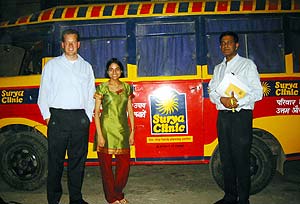Getting out in the field, talking to clinic staffers and investigating micro health insurance
After doing a little sightseeing, we interviewed physicians both within and outside the Surya Clinic network, rural health practitioners in Titli Centers, and patients. (We were aided by Akhilesh and Latika, who are Janani managers, and Gopi, a Janani program director.) One of our most insightful interviews was with Manoj, the "administrator" at a clinic in Biharsharif. An unassuming man, his responsibilities include scheduling appointments for patients. His close contact with patients enabled him to spell out their unmet medical needs, their ability to pay for such services, and his clinic's financial limitations on making the necessary investments.
Our questions were aimed at assessing the possible expansion of products and services at the Surya Clinics, and the provision of health insurance in rural Bihar. Armed with fresh insights from our firsthand surveys, we charted a future course of action. Priya and Sunil, senior managers at Janani, were very helpful in providing us with a strong understanding of the evolving model of the Surya Clinics.
Since then, Mona and David have focused their energies on analyzing the feasibility of adding diagnostics and pathological test services at the Surya Clinics, while Julie and Amit are looking at the addition of micro health insurance plans to the Janani network. We have been pleasantly surprised that many diagnostic tests can be cheaply administered in rural areas: a blood sugar test, for example, costs only 15 cents to administer.
The insurance sector research has also been very interesting: the industry was recently privatized, and private health insurance is in its formative stages. With almost no health insurance and thus an absence of risk pooling, healthcare costs are the second biggest cause of indebtedness in the state of Bihar. We are in the process of meeting private insurance companies to devise a health insurance package around reproductive and family health services and seek possible partnerships with Janani in the future.
óMona and Julie
Want to ask the India team a question? E-mail ibd_janani@hotmail.com.



